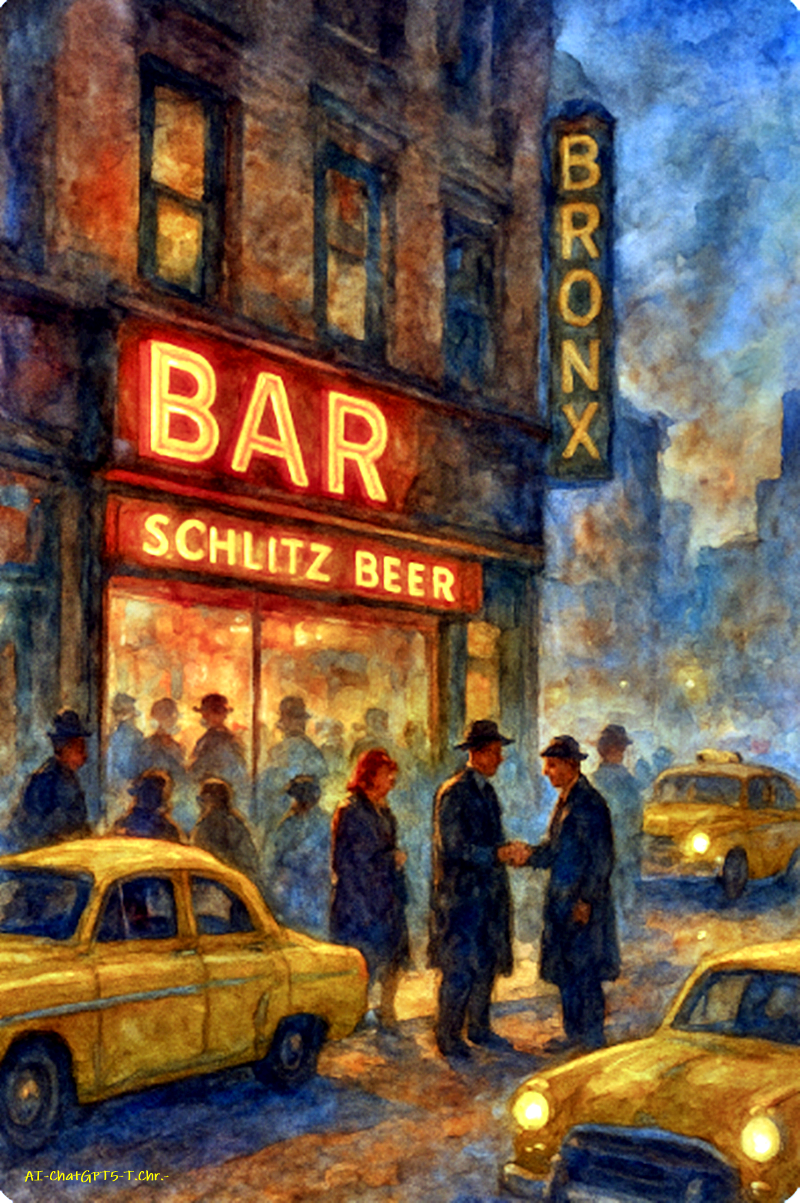A SOLID HEART IN THE BRONX - NYC

By T.Chr.-Human Synthesis-25 August 2025
The Bronx in the 1950s was a living thing, a rough-edged but golden-lit neighborhood where men walked home in their work boots with pride still clinging to their shoulders. The days were hard, hours long in factories, on docks, in garages that smelled of grease and gasoline, but there was a rhythm to it all, a certainty that tomorrow would follow yesterday with the same grit and dignity. And when evening came, the neon hum of little corner bars called them like church bells.
Stories of Honour, Love, and Life in the Golden Glow of the Fifties
Inside those bars the air was thick with smoke and laughter. A jukebox blinked its colored lights like a mechanical heart, sending out Sinatra or Frankie Lymon into the room. Behind the counter, bartenders in rolled-up sleeves poured out Nickebockers, Schlitzen, or rye whiskey without pretension. Seamen drifted in from the ports, bringing with them foreign coins, salt-stained caps, and stories that widened the eyes of locals. In the back, a dark booth might shelter a few rough-faced gang members whispering plans, but they too were part of the fabric. Everyone mixed here—steelworkers, sailors, truck drivers, the corner barber, even the priest who would stop in for a quick beer and smile. At the end of the night, men shook hands before parting, their promises heavier than contracts, their word a chain of iron.
These bars were more than drinking halls; they were living rooms without lace curtains, kitchens without Sunday roasts, spaces where the neighborhood met itself. Old friends told the same stories again and again as though hearing them fresh each time. Cousins back from service were welcomed like returning kings. Children of the neighborhood who had grown into men swapped news of promotions, marriages, or high school triumphs. The jukebox hummed and blinked, and the clatter of glasses and laughter made the room pulse like a heartbeat of its own.
Tommy O’Hara was one of these men. A wiry kid who had turned into a broad-shouldered man, he worked down on the East River docks, hauling ropes and crates, never afraid of sore muscles or rough weather. His life wasn’t rich in money, but it was rich in the rituals of the neighborhood: the shared meals, the loud talk in the bars, the Saturday ball game in the park, the careful nods of respect given and received. Tommy’s best companions were the old timers who’d seen it all, and the boys he’d known since school days, men who had grown up in the same tenement halls with the same leaking roofs.
Before his life had settled into the rhythm of work and home, there had been Maggie Callahan. Tommy remembered her well—the girl who could outrun most of the boys in the alleys, who grew into a woman with eyes like the Bronx skyline at twilight, tough and tender all at once. In youth, they had shared summer walks, candy from street carts, evenings on the Coney Island boardwalk with the sea wind tangling their hair. But Maggie was restless, always chasing a life bigger than the Bronx. She left for Manhattan, for the bright lights of Broadway, leaving Tommy behind with the ache of something unfinished.
Later, Eileen came into his life—steady, practical, and full of warmth. She kept their home, the children, and the dinner table, weaving comfort and endurance into his world. Tommy’s love for her was quiet, solid, built on the reality of shared life rather than youthful fever. Maggie remained a memory, a spark of what might have been, tucked carefully in his chest.
For years, Tommy and Maggie’s lives brushed past each other. Sometimes she would appear in the bar, a laugh cutting through the jukebox music. Tommy would sit back and watch, a shadow of the boy who had once chased her down fire escapes, learning that some flames could warm and scorch at the same time.
Life on the docks was not without danger. Tommy’s friend, Sal, got caught up with the gang boys lurking in corners, planning petty raids and bigger crimes. Whispers of stolen shipments and broken promises rattled through the piers. One evening, Sal confided in Tommy, pale and desperate. “If I tell the foreman,” he whispered, “they’ll kill me.” Tommy’s chest tightened. Honour demanded something of him. In the quiet resolve that had built his character since boyhood, Tommy made the choice: he and Sal went to the foreman together, speaking the truth. Sirens followed, arrests were made, but no revenge came their way. Even the gangs, it seemed, respected a man who held his word.
But life had its darker temptations. One damp October evening, after a long shift on the docks, Tommy found himself in a corner of Sammy’s with a few friends who were talking quietly about a shipment that had gone missing. The gang boys were away for the night, and curiosity—or perhaps loyalty—pulled Tommy in. A crate of imported liquor, destined for a local bar, had been “misplaced.” Tommy’s friends saw an opportunity; he hesitated. It wasn’t about greed—he had his wages, his home, his children—but about protecting his own in a world where lines were blurry. In a split second, Tommy helped move the crate to a safe place, keeping it from falling into the wrong hands.
The next day, the police came sniffing, investigating the missing shipment. Tommy’s heart pounded, but he kept his mouth shut, letting the truth twist just enough to avoid pointing fingers at his friends. He hadn’t stolen, he hadn’t cheated anyone—but he had bent the rules, and for a few tense hours, his world teetered. When the investigation cleared, Tommy realized how close he had come to losing everything—his job, his reputation, even the trust of his family. From that night onward, he carried himself with sharper awareness. The bars, the docks, the neighborhoods—they were all full of opportunity for missteps, temptations, and quick fixes. But he learned that a handshake, a promise, a clear conscience, and the steady love of Eileen and his family were worth more than any temporary gain.
Years passed, and the little bars remained the same. The amber glow, the smoke curling toward slow-turning ceiling fans, the hum of familiar voices—it all endured. Tommy sat on his usual stool at Sammy’s, the amber light pooling around him like warm honey. The jukebox hummed a slow ballad that seemed to carry the sigh of the city itself. Old friends laughed over shared memories. A young sailor bought a round, nodding to the familiar faces as though he’d always belonged.
And then, as if the years had folded back on themselves, Maggie came in. She was older now, time tracing soft lines around her eyes, but her gaze still held the sparkle Tommy remembered. She slid onto the stool beside him, and for a few moments the decades vanished. They did not speak of what could have been, nor did they need to. In the golden glow, old promises and memories hovered in the air, as solid and unshakable as the handshakes that had kept generations honest.
They shared a slow drink, listened to the jukebox, watched the room pulse with life. Firemen laughed in corners, neighbors traded jokes over glasses of Schlitz, and the sailors from the docks swapped tales in accents thick and musical. The bar held its magic—everyone familiar, everyone woven into a shared history. Tommy raised his glass quietly, a toast to work, to love, to friendship, and to honour.
And so, looking back, he understood that life was measured not in years or wealth, but in the quiet weight of honour kept, promises held, and love given; in the Bronx of the fifties, amid smoky bars and familiar laughter, a man’s word, a steady hand, and a loyal heart were more enduring than any city skyline, and that solidity—simple, unshakable, and true—was the treasure that outlasted all else.
